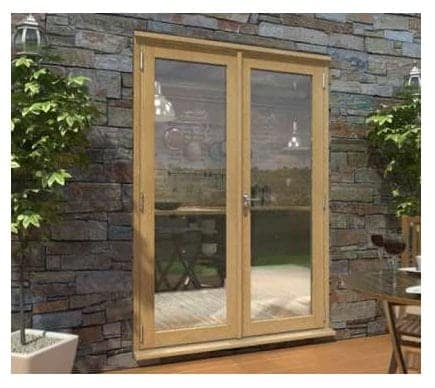
French doors are a fantastic way to let natural light into your home, and provide an added sense of space. They’re often installed as outward opening doors that open into the garden. With a multi point locking system, and double glazing options, exterior french doors are a fantastic way to improve your home’s security.
This helps extra daylight enter your home in winter, and breaks down the barrier between your indoor and outdoor living spaces in the summer. This blog will teach you about some basic french door safety, and some tips on how to make your french doors secure.
French doors emerged as a way for French aristocrats to look out on to their estates. They were traditionally employed leading out onto upper-story balconies for maximum visual impact. In modern design, external french doors have been more popularised within the home.
For all their virtues, however, exterior french doors do come with a few safety concerns. When opening out on upper floors, they can pose a serious safety risk to pets and children. With a few considerations though, you can make sure your french door safety isn’t a concern. As increasingly popular external doors, it is important to ensure your french doors are as secure as possible.
If you have young children, you don’t want them to wander outside through open patio doors unattended.
One way to prevent this is to invest in a French door safety gate. These are designed to fit within the frame of the door. They extend across it to form a barrier that children can’t get through. These vary in build quality and functionality, but are suitable for most french doors, including uPVC french doors.
Cheaper safety gates are generally unattractive and made from thin fragile plastic that can snap within a few months. Pay a little more and you’ll get something sturdier for your external french doors. It is also worth noting whether the French door safety gate requires a threshold at the bottom. These can present a trip hazard when the gate is retracted.
A French door gate will need to extend over the span of two doors, meaning they will cost more than single, internal door gates. Since gates of this sort are needed for just a few years, you might consider tracking down a second-hand one to increase your french door security.
Another benefit of safety gates is that they prevent children (or pets) from colliding with the door’s large glass panels.
Pets can be trickier to contain than children. You could install a pet gate to your French doors, even uPVC french patio doors, but your pet might not respect it right away. An adult cat will be able to easily hop over a waist-height gate, as will many larger dogs.
If you have both a cat and a dog, you’ll know they have different needs. Cats like to roam the outside world as they please, whereas dogs need accompaniment outside. A French door safety dog gate with a cat-flap built-in can be a great solution for your set of french doors. It gives your cat easy access in and out whilst keeping your dog inside.
Installing a cat-flap into your French door will save you the trouble of opening the door every time the cat wants to go out or come in. That said, modifying the large glass panels of a French door with a cat flap in this way can often result in major costs. The glass panels themselves will often need to be entirely replaced. Slicing into a panel of double-glazing will break the seal and allow the gas within to escape. Due to its cost, this option may not be worth it for older french doors.
So far we’ve considered how to prevent the children and pets from escaping your home via the French Doors – but what about the danger posed by slamming? Trapped fingers and tails can be especially painful, while doors which are being constantly slammed are unlikely to enjoy long, happy lives.
French Doors that open outward will create room in the interior of a property, but they’re also at far greater risk from stray gusts of wind. Compared to sliding patio doors, and other sliding glass doors, external french doors have an increased risk of breaking. What’s required is a means of holding both doors into position.
Among the most straightforward is to drag a heavy object in front of both doors. If you rarely find yourself opening and closing the doors, then this solution might prove effective. A sufficiently weighty rock or plant-pot might do just the trick, even if both pose something of a tripping hazard.
The same, of course, can be said of external door doorstops. These stubby devices are built into the decking just outside the doors. They prevent doors from hitting the wall, but they won’t protect children and pets in the same way. One solution is to mount the doorstop on the tops of the hinges, but this isn’t ideal.
Retaining hooks are a better solution. These attach to the walls on either side of your door, hooking neatly into the loops attached to the bottom. This solution is discreet and unobtrusive.
Commercial construction offers another option. French doors in public buildings tend to open outward so that people can easily exit in the event of a fire. These doors use hydraulic closers, which will prevent the panel from swinging quite so violently. Door closers come in the form of boxes that sit on either side of the door’s exterior. Even the smallest door closers are fairly easy to spot, and so while they might prevent the door from slamming shut, some homeowners may not be willing to pay the aesthetic cost.
If you have any questions, we’re always happy to talk! Find the best way to get in touch by visiting our contact page.